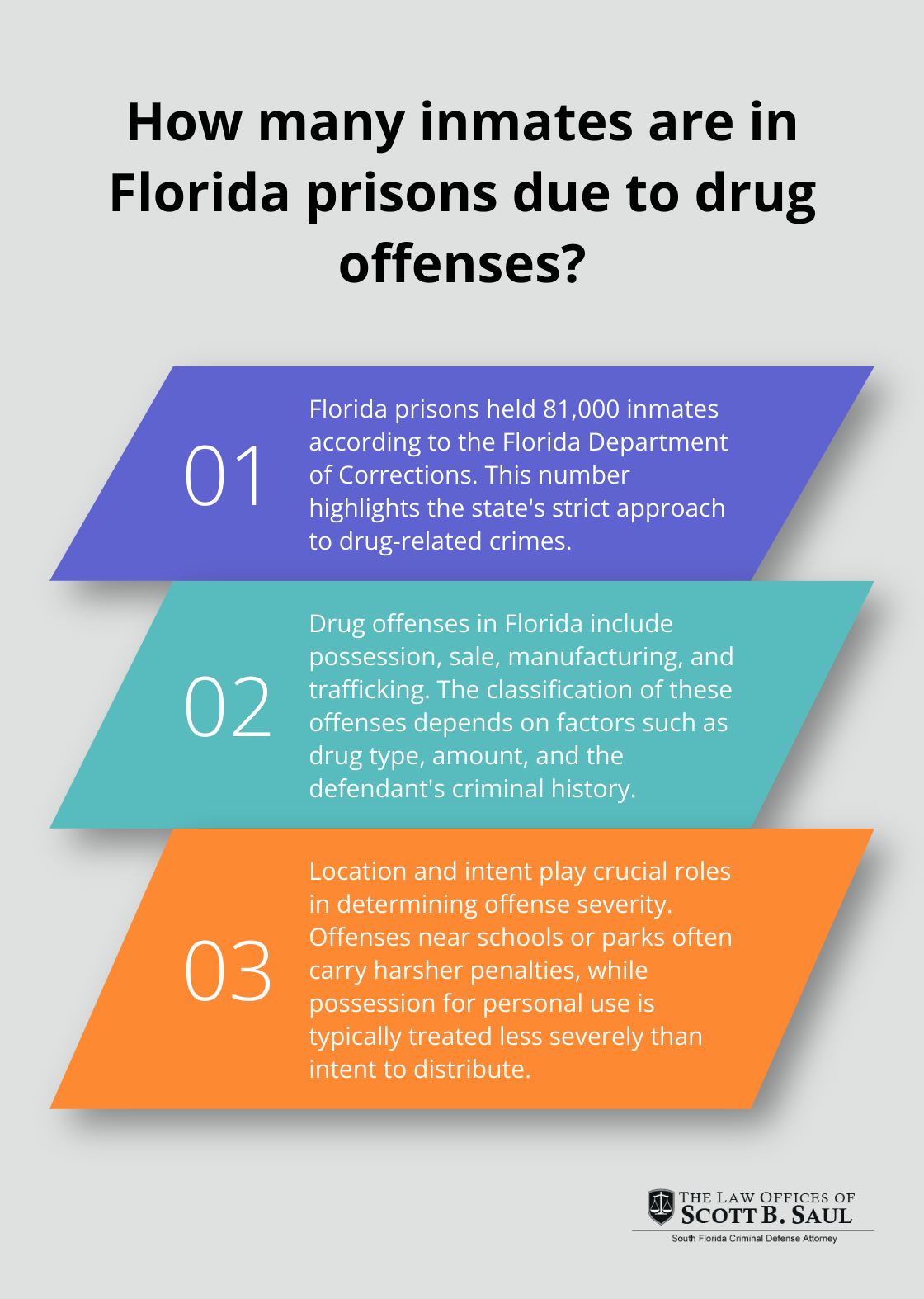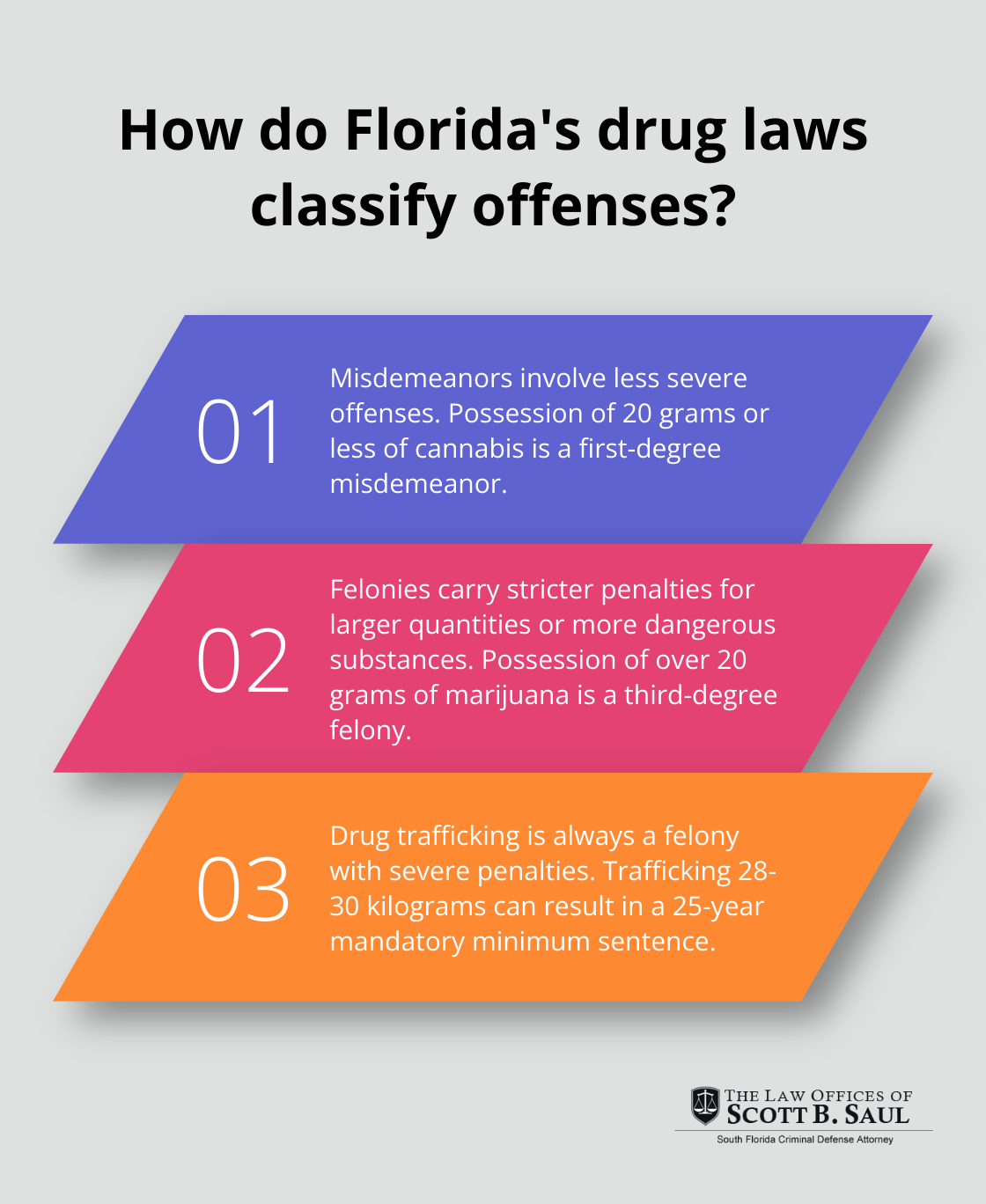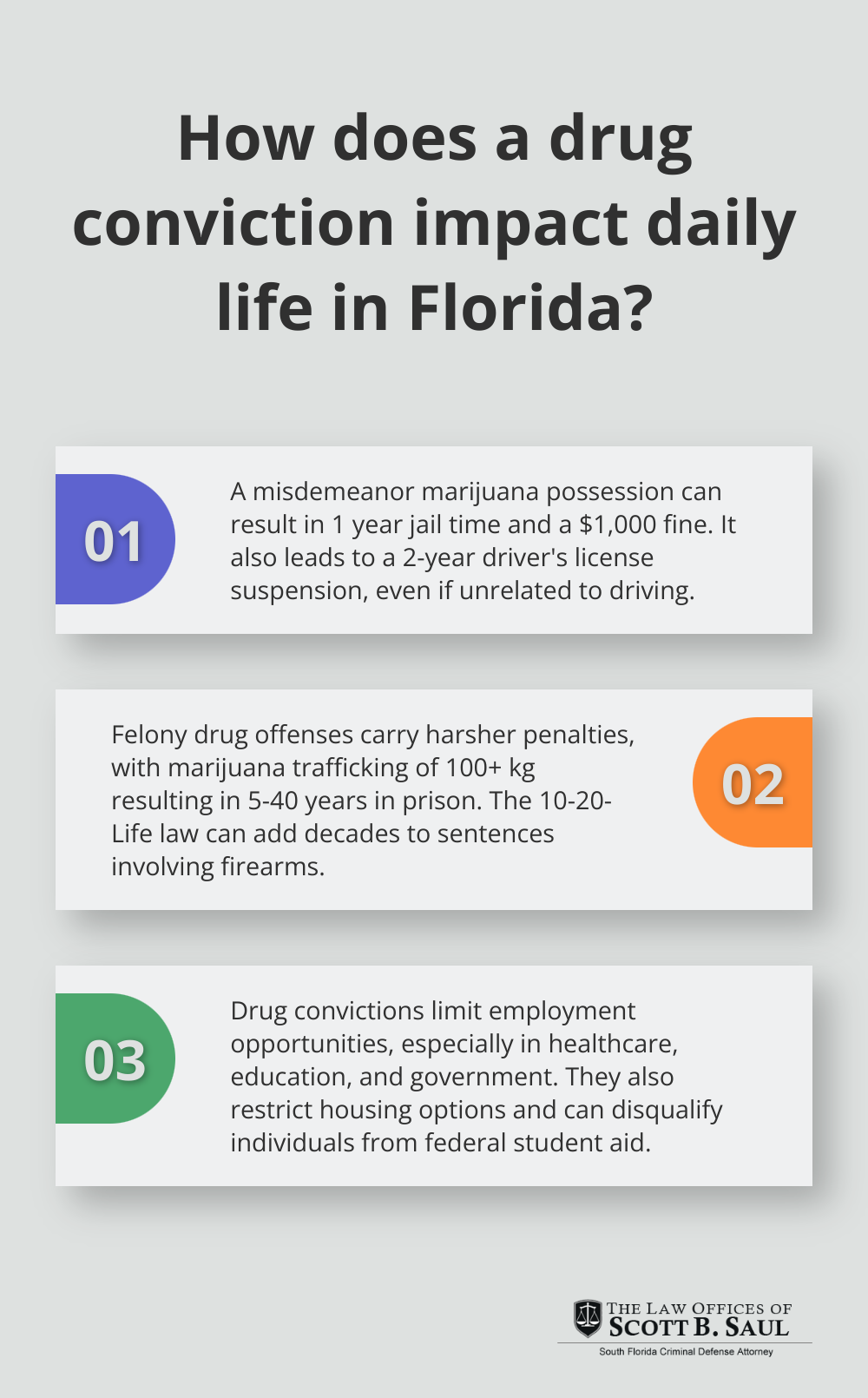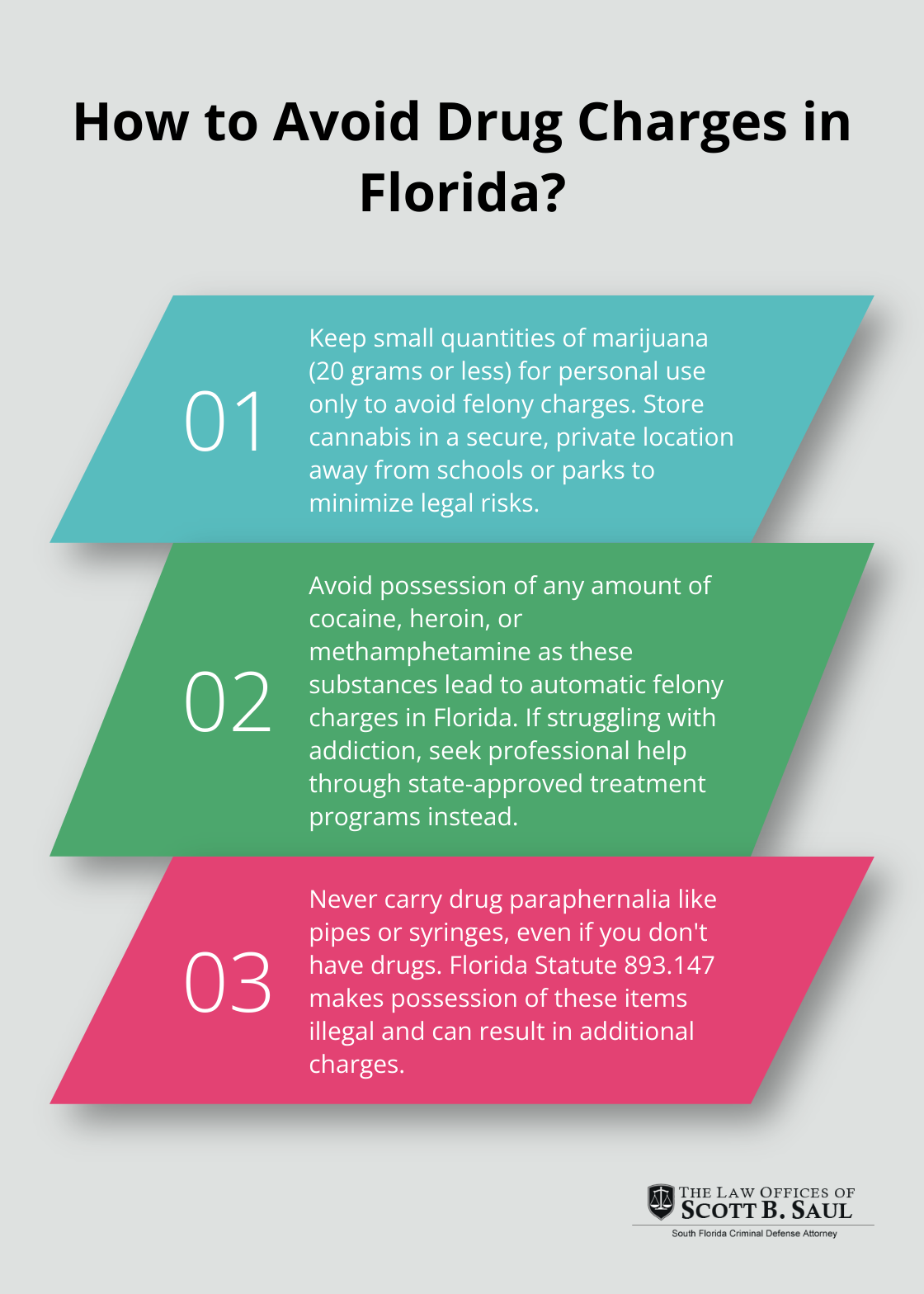Are All Drug Offenses Considered Felonies?
By : saulcrim | Category : Criminal Defense | Comments Off on Are All Drug Offenses Considered Felonies?
21st Nov 2024

Drug offenses in Florida can have serious consequences, but are all drug offenses felonies? The answer isn’t as straightforward as you might think.
At Law Offices of Scott B. Saul, we often encounter clients who are unsure about the classification of their drug charges. Understanding the difference between misdemeanor and felony drug offenses is crucial for anyone facing such allegations in Florida.
What Are Drug Offenses in Florida?
Types of Drug Offenses
Florida law recognizes several types of drug offenses. The most common include possession, sale, manufacturing, and trafficking. Possession charges apply when a person knowingly controls a controlled substance. Sale and distribution involve the transfer of drugs to another person. Manufacturing refers to the production of illegal substances, while trafficking involves the transport or sale of large quantities of drugs.
Factors Influencing Classifications
The classification of a drug offense in Florida depends on several key factors. The type and amount of the drug play a significant role. For instance, possession of a small amount of marijuana might result in a misdemeanor charge, while possession of the same amount of cocaine could lead to a felony.

The defendant’s criminal history also impacts the classification substantially. First-time offenders may face less severe charges compared to repeat offenders. According to the Florida Department of Corrections (FDC), there were 81,000 inmates in prisons, which underscores the seriousness with which the state treats these crimes.
Location and Intent
Where the offense occurs can affect its classification. Drug offenses committed near schools, parks, or other protected areas often carry harsher penalties. The intent behind the possession is another critical factor. Possession for personal use typically receives less severe treatment than possession with intent to distribute.
Impact of Specific Circumstances
Certain circumstances can escalate the severity of drug charges. For example, possession of drug paraphernalia can add to the charges. Florida Statute 893.147 makes it illegal to possess, use, manufacture, sell, or transport drug paraphernalia. Additionally, the presence of weapons during a drug offense can significantly increase the penalties.
Legal Complexities
The legal landscape surrounding drug offenses in Florida is complex and ever-changing. Recent changes in marijuana laws, for instance, have altered how some possession cases are handled. This complexity underscores the importance of understanding the nuances of drug laws and their application.
As we move forward, it’s important to distinguish between misdemeanor and felony drug offenses, as the classification greatly affects the potential consequences a defendant might face.
Misdemeanor vs Felony Drug Charges: What’s the Difference?
Understanding Drug Offense Classifications in Florida
Florida law categorizes drug offenses as either misdemeanors or felonies. The classification significantly impacts the severity of consequences a defendant might face. This distinction plays a key role in determining the legal strategy and potential outcomes of a case.
Misdemeanor Drug Offenses: Lesser Charges, Serious Impacts
Misdemeanor drug charges typically involve less severe offenses and carry lighter penalties. In Florida, the most common misdemeanor drug offense is possession of small amounts of marijuana. Specifically, delivering without consideration 20 grams or less of cannabis is classified as a first-degree misdemeanor. This offense can lead to up to one year in jail and a fine of up to $1,000.

Another example of a misdemeanor drug offense in Florida is possession of drug paraphernalia. This charge often accompanies other drug possession charges and can result in additional penalties.
It’s important to note that even misdemeanor drug charges can have serious consequences. A conviction can affect employment opportunities, housing applications, and educational prospects (impacting various aspects of an individual’s life).
Felony Drug Offenses: Severe Charges with Harsh Penalties
Felony drug charges are more serious and carry stricter penalties. These charges often involve larger quantities of drugs, more dangerous substances, or intent to distribute.
For instance, possession of more than 20 grams of marijuana is a third-degree felony in Florida. This offense can result in up to five years in prison and a fine of up to $5,000. Possession of cocaine, heroin, or methamphetamine in any amount also constitutes a felony.
Drug trafficking charges always fall under the felony category and carry some of the most severe penalties. For example, trafficking 28 grams or more, but less than 30 kilograms, can result in a mandatory minimum term of imprisonment of 25 years.
The Florida Department of Corrections reports that drug offenses account for 16.5% of the state’s prison population, which highlights the seriousness with which these crimes are treated.
Factors Influencing Charge Classification
Several factors can influence whether a drug offense is classified as a misdemeanor or felony:
- Type of drug: Possession of Schedule I or II drugs (like cocaine or heroin) is more likely to result in felony charges.
- Quantity: Larger amounts of drugs typically lead to felony charges.
- Intent: Possession with intent to distribute usually results in a felony, even for smaller quantities.
- Location: Drug offenses committed near schools or parks often result in enhanced charges.
- Prior convictions: Repeat offenders are more likely to face felony charges.
The complexity of these factors underscores the importance of experienced legal representation. A skilled attorney will analyze every aspect of a case to build the strongest possible defense for their clients.
As we move forward, it’s essential to understand the specific legal consequences and penalties associated with both misdemeanor and felony drug offenses in Florida. These potential outcomes can have long-lasting effects on an individual’s life and future prospects.
What Are the Real Consequences of Drug Convictions?
Misdemeanor Drug Offense Penalties
Misdemeanor drug offenses in Florida carry significant penalties that can alter a person’s life. Possession of 20 grams or less of marijuana, a first-degree misdemeanor, can result in up to one year in jail and a $1,000 fine. Convicted individuals may also face probation, mandatory drug counseling, and community service.

A lesser-known consequence is the automatic driver’s license suspension for two years (even if the offense wasn’t related to driving). This suspension can severely impact employment opportunities and daily life, especially in areas with limited public transportation.
Felony Drug Offense Penalties
Felony drug offenses carry much harsher penalties. Trafficking 100 kilograms or more of marijuana can result in a minimum of 5 years in prison, up to 40 years. These mandatory minimum sentences underscore the severity of felony drug charges.
Florida’s 10-20-Life law can apply to drug offenses involving firearms, potentially adding decades to a sentence. This fact underscores the importance of understanding all aspects of a drug charge.
Long-Term Impacts on Employment
A drug conviction can severely limit employment opportunities, especially in fields like healthcare, education, and government. Many employers conduct background checks, and a drug conviction often serves as an immediate disqualifier. This limitation can force individuals into lower-paying jobs or industries with fewer advancement opportunities.
Housing Challenges
Housing can become a significant challenge for those with drug convictions. Many landlords and property management companies refuse to rent to individuals with such records. This refusal can force people into less desirable living situations or areas with fewer economic opportunities, perpetuating a cycle of disadvantage.
Education and Financial Aid Restrictions
Education prospects may suffer due to drug convictions. Federal student aid can be denied to those with drug-related offenses. A federal or state drug conviction can disqualify a student from federal financial aid funds, with penalties ranging from 1 year to indefinite ineligibility depending on the offense and prior convictions.
Family and Social Impacts
Drug convictions can devastate families. Parents with such convictions may face challenges in custody battles or even risk losing their parental rights altogether. The stigma associated with drug convictions can also lead to social isolation and mental health issues. The Florida Department of Health reports that individuals with substance use disorders are more likely to experience depression and anxiety, a situation that legal troubles can exacerbate.
Final Thoughts
Drug offenses in Florida range from misdemeanors to felonies, with classifications depending on factors like drug type, quantity, and circumstances. Not all drug offenses are felonies, but many carry severe consequences that impact an individual’s life significantly. Misdemeanor charges can result in jail time and fines, while felony offenses lead to harsher penalties and long-lasting repercussions.

The severity of drug charges in Florida affects various aspects of life, including employment, housing, and education opportunities. Even misdemeanor convictions can create significant challenges, while felony convictions often have devastating long-term consequences (such as loss of parental rights). The complexity of drug laws and the serious nature of these charges make it essential to seek experienced legal counsel when facing any drug-related offense.
At Law Offices of Scott B. Saul, we understand Florida’s drug laws and the potential consequences of drug convictions. Our team provides aggressive representation to protect your rights throughout the legal process. Don’t face these charges alone; seek professional legal assistance to navigate the complexities of your case and work towards the best possible outcome.
Archives
- July 2025 (1)
- June 2025 (9)
- May 2025 (9)
- April 2025 (8)
- March 2025 (9)
- February 2025 (8)
- January 2025 (9)
- December 2024 (10)
- November 2024 (5)
- July 2024 (2)
- June 2024 (2)
- May 2024 (2)
- April 2024 (2)
- March 2024 (2)
- February 2024 (2)
- January 2024 (2)
- December 2023 (2)
- November 2023 (2)
- October 2023 (2)
- September 2023 (2)
- August 2023 (1)
- July 2023 (2)
- June 2023 (2)
- May 2023 (2)
- April 2023 (2)
- March 2023 (2)
- February 2023 (2)
- January 2023 (2)
- December 2022 (2)
- November 2022 (2)
- October 2022 (2)
- September 2022 (2)
- August 2022 (2)
- July 2022 (2)
- June 2022 (2)
- May 2022 (2)
- April 2022 (2)
- March 2022 (2)
- February 2022 (2)
- January 2022 (2)
- December 2021 (2)
- November 2021 (2)
- October 2021 (2)
- September 2021 (2)
- August 2021 (2)
- July 2021 (2)
- June 2021 (2)
- May 2021 (2)
- April 2021 (2)
- September 2020 (5)
- July 2020 (4)
- June 2020 (4)
- May 2020 (4)
- April 2020 (5)
- March 2020 (4)
- February 2020 (4)
- January 2020 (4)
- December 2019 (1)
- November 2019 (4)
- October 2019 (4)
- September 2019 (4)
- August 2019 (4)
- July 2019 (5)
- June 2019 (4)
- May 2019 (4)
- April 2019 (4)
- March 2019 (4)
- February 2019 (4)
- January 2019 (4)
- December 2018 (4)
- November 2018 (5)
- October 2018 (5)
- September 2018 (4)
- August 2018 (4)
- July 2018 (7)
- June 2018 (4)
- May 2018 (4)
- April 2018 (8)
- March 2018 (4)
- February 2018 (4)
- January 2018 (4)
- November 2017 (4)
- October 2017 (4)
- September 2017 (4)
- August 2017 (7)
- July 2017 (6)
- June 2017 (4)
- May 2017 (4)
- April 2017 (4)
- March 2017 (4)
- February 2017 (7)
- January 2017 (4)
- December 2016 (7)
- November 2016 (4)
- October 2016 (4)
- September 2016 (10)
- August 2016 (4)
- July 2016 (4)
- June 2016 (4)
- May 2016 (4)
- April 2016 (4)
- March 2016 (4)
- February 2016 (7)
- January 2016 (4)
- December 2015 (5)
- November 2015 (4)
- October 2015 (7)
- September 2015 (4)
- August 2015 (4)
- July 2015 (13)
- June 2015 (9)
- May 2015 (8)
- April 2015 (6)
- March 2015 (4)
- February 2015 (4)
- January 2015 (4)
- December 2014 (4)
- November 2014 (4)
- October 2014 (4)
- September 2014 (3)
Categories
- Adjudication (1)
- Bankruptcy (1)
- Burglary Crimes (3)
- calendar call (1)
- Car Accident (1)
- Criminal Defense (332)
- Cyber Crimes (7)
- DNA (1)
- Domestic Violence (9)
- Drug Crimes (5)
- DUI (12)
- Embezzlement (1)
- Environmental Crimes (4)
- Expungement Law (2)
- Federal Sentencing Law (3)
- Firearm (3)
- Forgery (4)
- General (82)
- Healthcare (3)
- Immigration (1)
- Indentity Theft (1)
- Insurance (5)
- judicial sounding (2)
- Juvenile Crimes (4)
- Manslaughter (4)
- Money Laundering (3)
- Organized Crime (1)
- Racketeering (1)
- Reckless Driving (3)
- RICO (3)
- Sealing and Expunging (2)
- Sex Offense (1)
- Shoplifting (1)
- Suspended Driver's License (1)
- Traffic (4)
- Trending Topics (1)
- White-collar Offenses (1)

